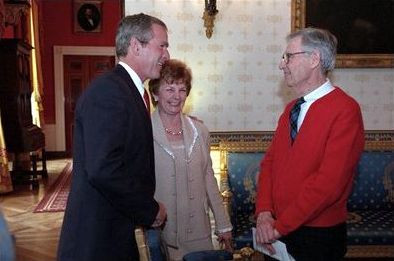
A Mr. Rogers biopic is reportedly in the works. Fred McFeely Rogers, the direct yet soft spoken Pennsylvanian who delighted Americans of all ages with his program, "Mr. Rogers' Neighborhood", was called an "inspirational man for so many people" by Justin Nappi of Treehouse Productions. Treehouse is reportedly the company that will produce the biographical film, which will be written by Alexis Jolly from "The Ellen DeGeneres Show".
Fred Rogers hosted "Mr. Rogers' Neighborhood" from 1968 through 2001, taking viewers on tours of his 'neighborhood' and on daily rides on the trolley to the Neighborhood of Make Believe, ruled by King Friday XIII.
There is no word yet on who will play the late Mr. Rogers, who died of stomach cancer in 2003 just before his 75th birthday. The "Today" show offered a few ideas, listing "Ferris Bueller" Matthew Broderick, "How I Met Your Mother" star Neil Patrick Harris, and Jim Parsons, who plays Sheldon on "The Big Bang Theory".
Likely no one can capture all of the qualities of Fred Rogers on any medium, but these celebrities would prospectively do well in the role.
Fred Rogers was born March 20, 1928 in the small city of Latrobe, Pennsylvania, between Altoona and Pittsburgh. He would often visit his grandfather, Fred McFeely, who likely was the inspiration for the jovial letter carrier Mr. McFeely on "Mr. Rogers' Neighborhood". The two would play music together, and Fred Rogers soon began playing piano on his own accord as a child.
He attended Dartmouth College and later graduated from Rollins College, majoring in Music Composition. The soft-spoken Rogers intended to become a Presbyterian minister, and was eventually ordained.
However, on a visit to his parents' home, he reportedly had his first contact with the television. His dislike of the content broadcasted on it led him to change his focus to working in the television industry itself. "I went into television because I hated it so," Rogers told CNN in 1999, "I thought there [was] some way of using this fabulous instrument to nurture those who would watch and listen."
This mindset led Rogers to nearby Pittsburgh, where he began working for public station WQED, working as a puppeteer on "The Children's Corner". It was on this program he reportedly co-created his famous 'make-believe' friends King Friday and X the Owl.
The first version of the "Neighborhood" aired on Canadian broadcasting after Rogers moved to Toronto. It was simply titled "Misterogers". He later returned to WQED and "Mister Rogers' Neighborhood" began airing on select public television stations in 1968.
In 1969, he made a famous appearance on Capitol Hill, and eventually was able to change the mind of former Sen. John Pastore, D-R.I., chairman of the subcommittee hearing Rogers' testimony on funding for PBS. Rogers said programs like his contrasted with other media.
A young Rogers began his testimony by telling Pastore he trusted that the senator would read Rogers' 10-page document supporting the continuation of funding that President Richard Nixon was thinking of ending. Pastore interrupted Rogers irately, asking whether he would just feel better reading the affidavit. Rogers quietly said he would describe it instead. He said that his first WQED budget was $30 per episode, and that thanks to funding, the budget had risen to $6000, which Rogers said was only enough to air 2 minutes of programming on other private stations.
Pastore was unfamiliar with "The Neighborhood", and eventually changed his mood from impatience to intent. "I give an expression of care every day to each child," Rogers said, "to help him realize that he IS unique." He then choked up somewhat, as reiterated his show's closing, which remarked on the uniqueness of each young viewer. "I'm constantly concerned about what our children are seeing." "Feelings are mentionable...I think that it is much more dramatic that two men could be working out their feelings of anger-much more dramatic than showing something of gunfire," Rogers pled.
"I'm supposed to be a pretty tough guy," Pastore said to Rogers, "and this is the first time I've had the feeling of goosebumps for the last two days."
Rogers' words resonated with the committee, as his program continued into the next century. "Looks like you just earned the $20 million," Pastore quipped, after Rogers read words of his song, "What Do You Do With The Mad That You Feel", to close his testimony. [SEE THE VIDEO HERE]
The hearing and all of the most memorable moments in the "Neighborhood" are likely to be covered in detail in the upcoming Mr. Rogers biopic. Rogers earned a Lifetime Acheivement Award at the Daytime Emmy Awards in 1997.
© 2025 Latin Times. All rights reserved. Do not reproduce without permission.




